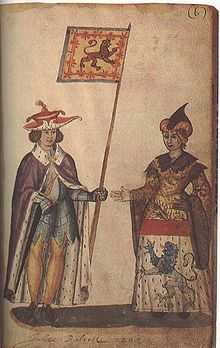Isabella de Warenne
| Isabella de Warenne | |
|---|---|
| Baroness of Bywell | |
 Isabella with her husband | |
| Spouse(s) | John of Scotland |
|
Issue
Edward de Balliol | |
| Noble family | Plantagenet |
| Father | John de Warenne, 6th Earl of Surrey |
| Mother | Alice de Lusignan, Countess of Surrey |
| Born | c.1253 |
| Died | before 1292 |
Isabella de Warenne (c.1253- before 1292) was Baroness of Bywell by her marriage to John Balliol; there is however doubt that she lived to become his Queen consort when he succeeded to the Scottish throne.
Family
Isabella was the second of three children born to John de Warenne, 6th Earl of Surrey and his wife Alice de Lusignan, Countess of Surrey, maternal half-sister of Henry III of England. Her elder sister Eleanor, married Henry Percy and became mother of Henry de Percy, 1st Baron Percy. Their mother died while giving birth to Isabella's younger brother, William, who was killed in a tournament after he had married Joan de Vere and sired two children.
Life
On about 9 February 1281 Isabella married John Balliol, who had a claim to the Scottish throne. The marriage lasted about ten years. The Chronicle of Thomas Wykes records the marriage.[1] It has been established that the couple had at least one child:
- Edward Balliol, Scottish pretender, (d.1364). Married to Marguerite de Taranto, daughter of Philip I, Prince of Taranto (d. 1332) - annulled or divorced with no issue.
However, other children have been linked to the couple as other possible issue:
- Henry de Balliol. He was killed in the Battle of Annan on 16 December 1332, leaving no issue.[2]
- Agnes (or Maud) de Balliol was married to Bryan FitzAlan, Lord FitzAlan, and feudal Baron of Bedale. They were parents to Agnes FitzAlan (b. 1298), who married Sir Gilbert Stapleton, Knt., of Bedale [3] (1291–1324). Gilbert is better known for his participation in the assassination of Piers Gaveston, Earl of Cornwall.
It is believed that Isabella did not live to see her husband become King of Scotland, so it is likely that she died before 1292, when her husband ascended to the throne. However, some are of the opinion that Isabella did survive long enough to see her husband succeed and then abdicate.
Ancestry
| Ancestors of Isabella de Warenne | ||||||||||||||||||||||||||||||||||||||||||||||||||||||||||||||||||||||||||||||||||||||||||||||||||||||||||||||||||||||||||||||||||||||||||||||||||||||||||||||||||||||||||||||||||||||||||||||||||||||||||||||||||||||||||||||||||||||||||||||||||||||||||||||||||||||||||||||||||||||||||||||||||||||||||||||||||||||||||||||||||||||||||||||||||||||||||||||||||||||||||||||||||||||||||||||||||||||||||||||||||||||||||||||||||||||||||||||||||||||||||||||||||||||||||||||||||||||||||||||||||||||||||||
|---|---|---|---|---|---|---|---|---|---|---|---|---|---|---|---|---|---|---|---|---|---|---|---|---|---|---|---|---|---|---|---|---|---|---|---|---|---|---|---|---|---|---|---|---|---|---|---|---|---|---|---|---|---|---|---|---|---|---|---|---|---|---|---|---|---|---|---|---|---|---|---|---|---|---|---|---|---|---|---|---|---|---|---|---|---|---|---|---|---|---|---|---|---|---|---|---|---|---|---|---|---|---|---|---|---|---|---|---|---|---|---|---|---|---|---|---|---|---|---|---|---|---|---|---|---|---|---|---|---|---|---|---|---|---|---|---|---|---|---|---|---|---|---|---|---|---|---|---|---|---|---|---|---|---|---|---|---|---|---|---|---|---|---|---|---|---|---|---|---|---|---|---|---|---|---|---|---|---|---|---|---|---|---|---|---|---|---|---|---|---|---|---|---|---|---|---|---|---|---|---|---|---|---|---|---|---|---|---|---|---|---|---|---|---|---|---|---|---|---|---|---|---|---|---|---|---|---|---|---|---|---|---|---|---|---|---|---|---|---|---|---|---|---|---|---|---|---|---|---|---|---|---|---|---|---|---|---|---|---|---|---|---|---|---|---|---|---|---|---|---|---|---|---|---|---|---|---|---|---|---|---|---|---|---|---|---|---|---|---|---|---|---|---|---|---|---|---|---|---|---|---|---|---|---|---|---|---|---|---|---|---|---|---|---|---|---|---|---|---|---|---|---|---|---|---|---|---|---|---|---|---|---|---|---|---|---|---|---|---|---|---|---|---|---|---|---|---|---|---|---|---|---|---|---|---|---|---|---|---|---|---|---|---|---|---|---|---|---|---|---|---|---|---|---|---|---|---|---|---|---|---|---|---|---|---|---|---|---|---|---|---|---|---|---|---|---|---|---|---|---|---|---|---|---|---|---|---|---|---|---|---|---|---|---|---|---|---|---|---|---|---|---|---|---|---|---|---|---|---|---|---|---|---|---|---|---|---|---|---|---|---|---|---|---|---|---|---|---|---|---|---|---|---|---|---|---|---|---|---|---|---|---|---|---|---|---|---|---|---|---|---|---|---|---|---|---|---|---|---|---|---|---|---|---|---|---|---|---|---|---|---|---|
| ||||||||||||||||||||||||||||||||||||||||||||||||||||||||||||||||||||||||||||||||||||||||||||||||||||||||||||||||||||||||||||||||||||||||||||||||||||||||||||||||||||||||||||||||||||||||||||||||||||||||||||||||||||||||||||||||||||||||||||||||||||||||||||||||||||||||||||||||||||||||||||||||||||||||||||||||||||||||||||||||||||||||||||||||||||||||||||||||||||||||||||||||||||||||||||||||||||||||||||||||||||||||||||||||||||||||||||||||||||||||||||||||||||||||||||||||||||||||||||||||||||||||||||
References
- ↑ English Earls
- ↑ Dunbar, Sir Archibald H.,Bt., Scottish Kings - A Revised Chronology of Scottish History 1005 - 1625, Edinburgh, 1899: p. 118
- ↑ Norcliffe of Langton, M.A., Charles Best, editor, The Visitation of Yorkshire, 1563-64 by William Flower, Norroy King of Arms, London, 1881, p. 294 and footnotes